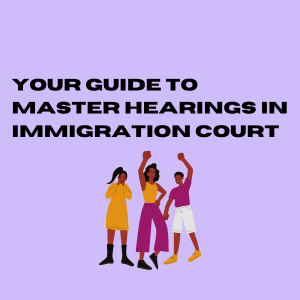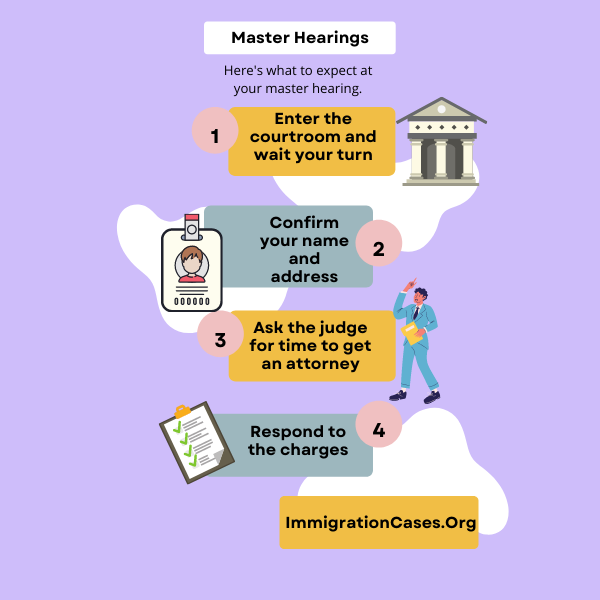What is a master hearing?
A master hearing, also known as a master calendar hearing, is a preliminary hearing at the immigration court. At these hearings, the immigration judge will do a few things:
- Read you your rights
- Tell you the charges against you
- Set a deadline for the next hearing
- Instruct you on what to do in the meantime

Who is present at a master hearing?
At your first appointment, there are three people in the court room:
- You. You have to be at the first hearings since you’re fighting your deportation.)
- The government attorney. This is the person who will argue in favor of your deportation. The government attorney is also known as a prosecutor.
- An immigration judge. This person decides if the government can remove you from the U.S.
What will the immigration judge decide at the first court hearing?
Many worry that when they show up to their first court hearing, immigration judges will deport them. But at the master hearing, the immigration judge will not make a final decision on whether to deport you.
In fact, at the first hearing, the judge will only make sure that you’re aware of the charges against you, and then set a time to respond to these charges.
How a master hearing different than a final or merits hearing?
A master hearing is much shorter than a merits or individual hearing. An individual hearing lasts hours while a master calendar hearing lasts a few minutes. The judge also asks fewer questions at preliminary hearings. An individual hearing is the final hearing, where the immigration judge decides whether to give you a deportation order.
What happens at a master calendar hearing?
Master hearings have two main purposes:
- make sure you understand why you are in the deportation process and what you can do
- to set deadline for the next steps in the process
Below is detailed list of steps at a master calendar hearing.
Step 1: Enter the courtroom
Within each courthouse are several courtrooms. Each room seats a different immigration judge. Your hearing notice will tell you the room number.
Step 2: Wait for the judge to call out your alien number
At master calendar hearings, there may be dozens of other immigrants waiting to see the immigration judge. The court identifies each person using an alien number. So when it’s your return, the judge or court clerk will call our your alien number and ask you to come to the front.
Step 3: The judge will confirm your name and address
Usually, one of the first things the judge will do is confirm your name and your current address. The immigration judge cares to have your current address so to make sure you don’t miss any future hearings. (If you miss a court hearing, you can get an automatic deportation order.)
Step 4: The immigration judge will read you your rights
When fighting a deportation, you have a number of rights. You have a right to:
- present evidence in your favor
- apply for relief from deportation
- present your own witnesses and ask questions to government witnesses
- have an attorney, but at no cost to the government
- appeal an immigration judge’s decision
It’s the immigration judge’s job to read your rights.
Step 5: The immigration judge will explain the charges against you
The law requires the judge to read the charges against you. What are these charges? These charges are the legal reasons that the government wants to deport you. The government can’t deport you for no reason at all. It needs a legal basis to do so.
These charges are found at the bottom of a document called the Notice to Appear.
The judge must explain these charges in “non-technical” language. So if you don’t understand why you are facing deportation, you should ask the judge the clarify.
Step 6: The judge asks you if you want time to find an attorney
At the first master hearing, the immigration judge will usually ask you if you want time to get an attorney. If you don’t want extra time, then the judge will proceed.
If you want extra time, then the judge will set a date for the next hearing. By the time of the next master hearing, you should bring an attorney.
Step 7: You respond to the charges
Assuming you have had enough time to find an attorney, you will then respond to the charges on the Notice to Appear. This is called “pleading.”
This is like when a defendant in criminal court responds to accusations that he did a crime. The criminal defendant says “guilty” and accept punishment. Or he says “not guilty” and continues to fight his case.
Similarly, in immigration court, you can said, “I deny the charge.”
Step 8: The judge explains how you can fight the charge, or whether you can apply for relief
If you deny that you are removable, the judge will then have to look at the evidence and make a decision on whether you can be deported. Sometimes the judge will schedule another master hearing to make that decision.
If the judge finds that you are removable, he will then have to explain if you can apply for any relief from deportation.

Preparing for your master calendar hearing
It’s critical to prepare for your master hearing. Here are several things you can do:
Find an immigration attorney.
This is perhaps the best thing you can do to prepare. An experienced lawyer will give you the best chance of fighting deportation. Immigration laws are complicated. When you look for an immigration attorney, try to find one with a lot of experience in court. Many immigration lawyers never step foot in a court room.
Review the charges.
The charges are found in a document called a Notice to Appear. You need to review this carefully to see if the allegations are correct. Immigration officials often make mistakes. If you catch an error, you can potentially stop your deportation.
Gather your records.
Often your case will depend on your immigration and criminal history. Several factors matter:
- when you came to the U.S.
- if you had a visa
- the type of visa
- when you left the U.S.
- if you were arrested
- whether you were sentenced for a crime
- the length of your sentence
Thus, you need to gather records relating to your immigration and criminal history.
Will I be deported at my first hearing?
Most immigrants worry they will show up to court and that immigration officials will arrest and deport them. As a result, they often choose not to go to court.
But in reality, immigrants are not arrested at their court hearings, especially master court hearings. The master hearings are where you learn why the government wants to deport you. They are also where you have a chance to respond to the charges.
Furthermore, even if a judge decides at a master hearing to give you a deportation order, nobody will arrest you and remove you from the country. You still have a chance to appeal your case.
What happens if I go to court without an attorney?
What if I present myself at my first hearing without an attorney?
If you go to your master hearing without an attorney, don’t fear.
At the first hearing, the immigration judge must give you a chance to find an attorney. The judge will first ask you if you want time to find an attorney. Then, sometimes the judge will ask you how much time you think you will need.
What if I present myself at my second hearing without a lawyer?
What happens at the second hearing if you still haven’t found an attorney? Sometimes it’s hard to find a good attorney. And sometimes they are expensive and you need time to gather the money for one. If you go to your second hearing without an attorney, you should be ready to tell the judge why you don’t have one. Prepare to explain to the judge:
- the steps you took to find an attorney
- why you did not hire one
- how much more time you think you will need to find one
If the judge thinks there are good reasons to give you more time, he will set another hearing date.
Otherwise, the immigration judge will go forward with your case. This means that he will ask you to respond to the charges against you, even though you do not have an attorney by your side.
What happens if I miss a court?
What are the consequences of not going to court?
If you don’t go for your hearing, the immigration judge can give you a deportation order in your absence. This is why you should go to court. At worst, you will get a deportation order anyway. But if you go to court, you can still appeal your case to a higher court. At best, you can get more time in the U.S. and even win the right to stay here permanently.



